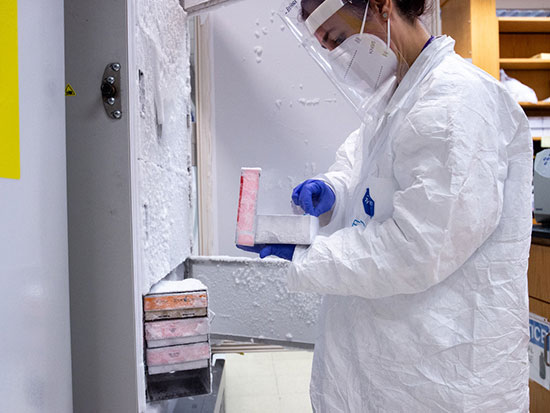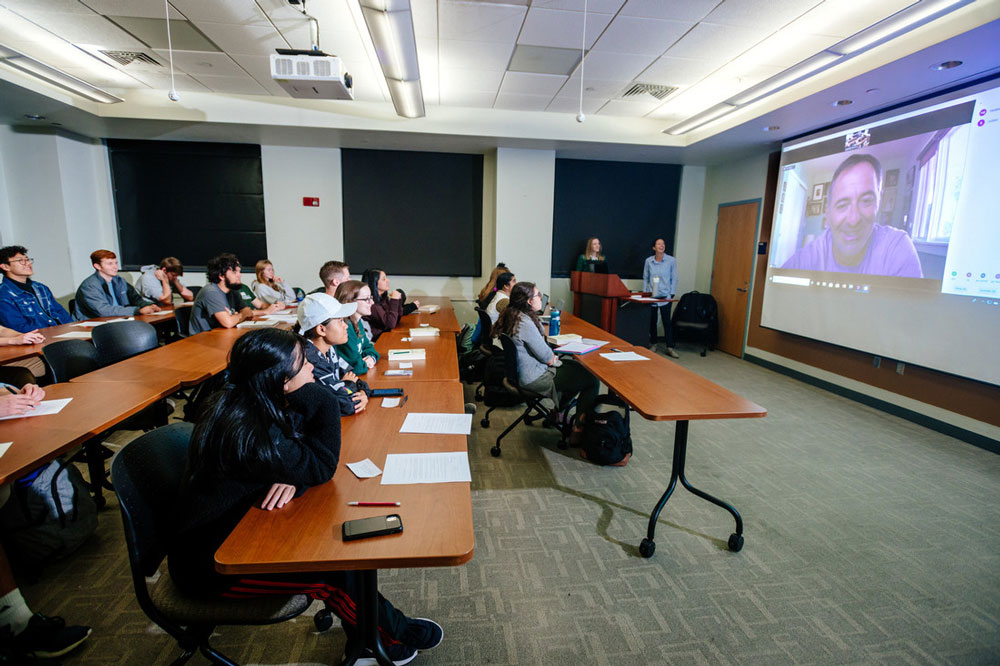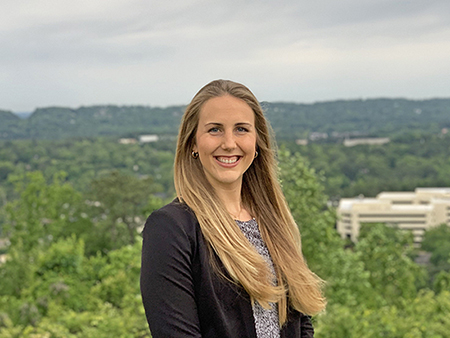 Researcher at work in the lab of Fran Lund, Ph.D., founding director of the UAB Heersink School of Medicine Immunology Institute and chair of the Department of Microbiology. UAB researchers have published a new paper on the most important factors that lead students to pursue education in immunology. LEXI COON | University RelationsOne lesson from the COVID pandemic is that immunology has never been more important. Another lesson: Immunologists have a lot of work to do to fully understand what we need to know about stopping this pandemic, and the next one — whether that is flu, another coronavirus or something else entirely.
Researcher at work in the lab of Fran Lund, Ph.D., founding director of the UAB Heersink School of Medicine Immunology Institute and chair of the Department of Microbiology. UAB researchers have published a new paper on the most important factors that lead students to pursue education in immunology. LEXI COON | University RelationsOne lesson from the COVID pandemic is that immunology has never been more important. Another lesson: Immunologists have a lot of work to do to fully understand what we need to know about stopping this pandemic, and the next one — whether that is flu, another coronavirus or something else entirely.
So how do you get more people interested in immunology careers? That is a question of interest to UAB faculty leading the Undergraduate Immunology Program, the only dedicated undergraduate immunology major offered at a university in the United States. (The UIP saw enrollment jump in fall 2020, adding 45-50 students and nearly doubling the cohort, although gains were smaller in 2021.) UAB is also home to a Graduate Biomedical Sciences program that features immunology as one of its eight themes of study. All of this gives UAB researchers a unique ability to dig into the factors motivating undergraduate and graduate students to choose — or avoid — immunology.
In a new paper published in the journal ImmunoHorizons, the UAB team has shared results from the first year of a planned five-year study that will eventually measure the effects of COVID-19 on students’ choice of career path as well. The current paper focuses on data from a pre-COVID survey of nearly 300 undergraduates and graduates majoring in immunology or in a comparable science program (neuroscience, chemistry, biology or biomedical sciences).
“The timing of the experience is critical, such that an educational experience at an advanced academic level, for example, in college, or a personal experience as a teen or young adult correlated with the decision to pursue an immunology degree.”
The researchers asked students about the experiences that either attracted them to or repelled them from immunology as a field of study. In particular, they wanted to know whether the experiences tended to be personal (having an autoimmune disease or knowing someone who did, for example) or educational (taking an interesting or frustrating immunology course, for example, or having a particularly engaging teacher). They also conducted personal interviews with 28 graduate students, both immunology majors and non-majors.
Here is what they learned
Education is most important. “A majority of both immunology and non-immunology majors had their initial exposure to immunology through an educational experience compared with a personal experience,” said Heather Bruns, Ph.D., associate professor and vice chair of Education in the Department of Microbiology and corresponding author of the ImmunoHorizons paper.
Timing matters. “Our data also indicate that the timing of the experience is critical, such that an educational experience at an advanced academic level, for example, in college, or a personal experience as a teen or young adult correlated with the decision to pursue an immunology degree,” the authors said.
“Truly been a blessing”
Learn why the Undergraduate Immunology Program’s first graduate, Peyton Blalock, made the choice for immunology in this story from April 2020. (Follow-up: Peyton is now in PA school at UAB, and other recent graduates from the program have gone on to medical school, pharmacy school and optometry school as well as research positions and graduate study.)
Hands-on experience is a plus. “Graduate students studying immunology report that having research experiences and/or an experience with a mentor positively influenced their decision to pursue immunology,” they noted.
The authors will continue to survey students each year. “The next four years will examine the aspects uncovered in this first survey more closely and also specifically ask about COVID as an influencing factor,” Bruns said.
In the meantime, the research can already help inform efforts to attract more students to immunology, Bruns notes. Personal interviews with graduate students emphasized that the brief introductions to immunology offered in courses at the undergraduate level often serve to dissuade students from continuing to learn more.
“I think immunology is very overwhelming if you try to skim it and that it really takes going into it in-depth to sort of make it less scary,” said one student currently majoring in immunology, as quoted in the paper. “So, it’s not something I really enjoyed until later in college.”
Immunology “has a lot of complex factors,” another immunology graduate student said. “If you start blurting out cells and not explaining what they’re doing and their roles and how they work together in a more simplistic way, it can easily kind of steer people by and turn them off because there’s so much that is involved within this field.”
 Students in an honors seminar for freshmen take part in a Skype call with Matt Richtel, the Pulitzer Prize-winning author of a book on the immune system the class was reading (see this related story). The Undergraduate Immunology Program is a collaboration between the departments of Microbiology and Biology. (This photo was taken prior to the COVID pandemic.) ANDREA MABRY | University Relations
Students in an honors seminar for freshmen take part in a Skype call with Matt Richtel, the Pulitzer Prize-winning author of a book on the immune system the class was reading (see this related story). The Undergraduate Immunology Program is a collaboration between the departments of Microbiology and Biology. (This photo was taken prior to the COVID pandemic.) ANDREA MABRY | University Relations
“The goal of the Undergraduate Immunology Program is to first and foremost provide students with a clear appreciation of how and why the immune system impacts each of us daily — protecting us from life-threatening infectious diseases on the one hand, and at the same time causing serious diseases associated with allergies and asthma, autoimmunity, and chronic inflammation,” said Louis Justement, Ph.D., co-director of the UIP and a co-author on the study. “The program essentially leads students through a four-year, in-depth, iterative curriculum that teaches them how the immune system works, how it causes disease and how it can be harnessed to treat disease.” The UIP also provides students with opportunities to perform undergraduate research in laboratories that focus on cutting-edge research in immunology to foster their critical thinking, problem solving, communication skills and ability to work in teams, Justement says. “The goal after four years is to train graduates who are ready to move on to the next level to drive real progress in combating the next pandemic, fighting autoimmune disease or developing the next immunotherapeutic intervention to treat cancer.”
In addition to Bruns and Justement, authors of An Analysis of Factors that Influence Students to Pursue Immunology are graduate students Ashlyn Anderson and Nicholas Buzzelli; Christine Loyd, Ph.D., and Samantha Giordano-Mooga, Ph.D., assistant professors in the Department of Clinical and Diagnostic Sciences in the School of Health Professions; and David Redden, Ph.D., professor in the Department of Biostatistics in the School of Public Health.
What it's like
Immunologists Heather Bruns, Ph.D., and Louis Justement, Ph.D., and their students answer two burning questions in these videos.
